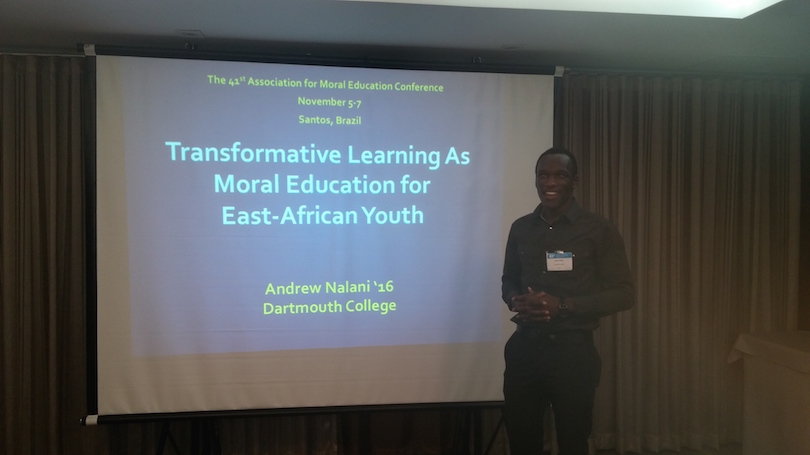
- Public Policy
- Leadership
- Funding
- News & Events
- About the Center
Back to Top Nav
Back to Top Nav
Back to Top Nav
Back to Top Nav
The Rockefeller Center's Mini-Grants program funds registration fees for students attending conferences relevant to the Rockefeller Center's mission as well as the costs of bringing speakers to the Dartmouth campus. A recent grant allowed Andrew Nalani ’16 to attend the 41st Annual Conference for the Association for Moral Education (AME) Conference in Santos, Brazil. Here is his first-hand account of the experience.
This fall I attended the 41st Annual Conference for the Association for Moral Education (AME) Conference in Santos, Brazil. I presented a paper, “Transformative Learning as Moral Education for East-African Youths” in which I discussed experiences of youth participants in a leadership program I directed in Uganda in summer 2014. The program, dubbed the African Youth Leadership Experience (AYLE) integrated the creative arts with leadership skills such as self-awareness, community engagement, social entrepreneurship and cross-cultural dialogue to empower youth participants to make their home communities better. I travelled with Professor Emeritus Andrew Garrod (Education Department) for whom I was a junior research assistant 2014-2015. Prof. Garrod and I gave two other presentations: “Can Theatre Help Heal the Wounds of Genocide? A Rwandan Romeo and Juliet” and “The Moral Making of the Global Citizen: The Case of the United World College in Mostar”—both presentations examined approaches to cultivating citizenship and inclusion. Under this year’s theme “Inequality and Social Justice” the scientific program for the AME Conference comprised several keynote addresses, symposiums, paper and poster presentations that debated the “role that moral education, psychology, philosophy and sociology can play in the struggle for justice, citizenship development, inclusion and democracy” (ame2015.net). This theme was timely and quite appropriate for an international inter-cultural gathering of scholars and practitioners. Emerging scholars from Nigeria, South Africa, Sierra Leone and Cameroon discussed privilege and conflict in four African universities and proposed a theory of change grounded in a post-colonial framework to destabilize privilege. In my conversation with these scholars, we discussed the recent “Rhodes Must Fall” protest movement that demanded the decolonizing of education institutions in South Africa. This discussion raised questions about the implications of race/racism within the classroom not just on individual development, but on social development too. Similarly, Prof. John Cavaleskie from University of Oklahoma questioned whether indeed tolerance should be heralded as a democratic virtue. Instead, he made the case for “bounded tolerance” as moral education i.e. that from outrage about what is intolerable, individuals learn about what their community considers the norm. Researchers from Harvard University presented a study on how Chinese youth understand civic participation. The case was made for considering local contexts in examining civic participation in diverse cultures—how culture and socialization shape how individuals define and enact moral and civic participation. Furthermore, a symposium, conducted in Spanish with English translation, delineated the impact of cultural oppression, political marginalization and racial discrimination on the developmental tasks—many of which are moral in nature—faced by indigenous peoples in the Amazon.
This discussion, led by two scholars from Lima and two indigenous leaders/educators from the Amazon considered the larger context (political, cultural, spiritual) of the lives of indigenous people in the Amazon while examining the potentials and dilemmas of intercultural education. In her lecture, “Indigenous Wisdom and Organic Morality,” Dr. Darcia Narvaez (University of Notre Dame), proposed a systems theory of human development that integrates neurobiological, clinical and developmental research with an ecological (and ethical) awareness that respects biodiversity akin to that found among many indigenous tribes. Narvaez situated current research on human development within the context of a planet endangered by climate change and ecological devastation as a result of activities of the modern world, arguing that the loss of bio-diversity and disconnection between humans and the natural world affects human flourishing and the development of an “other-oriented” morality and justice. This conference not only highlighted the moral and ethical issues that are of significant consequence in an increasingly interconnected world, but also modeled the kind of interdisciplinary scholarly conversation that furthers our understanding the complex challenges of injustice and inequality around the globe and how these challenges might be addressed. I am grateful to the Rockefeller Center, Stamps Leadership Scholar Award, Office of Student Affairs and to Dr. Andrew Garrod for supporting my experience in Santos. You may find the paper I presented in Santos in the conference proceedings: http://ame2015.net/wp-content/uploads/2015/11/Andrew_Nalani-Transformative_Learning_as_Moral_Education_for_East-African_Youths.pdf